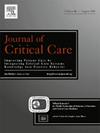高镁血症对接受持续肾脏替代治疗的急性肾损伤患者的临床影响:利用真实世界数据进行倾向评分分析。
IF 3.2
3区 医学
Q2 CRITICAL CARE MEDICINE
引用次数: 0
摘要
目的:众所周知,低镁血症是急性肾损伤(AKI)的一个危险因素,但高镁血症对接受持续肾脏替代治疗(CKRT)的AKI患者预后的影响仍不清楚。本研究探讨了高镁血症与此类患者临床预后之间的关系:方法:利用多中心医学资料库中 2001 年至 2019 年期间的数据进行了回顾性分析,涉及接受 CKRT 的患者。患者被分为正常镁血症(Results:在 2625 例患者中,有 1194 例(45.5%)血清镁水平升高。与正常镁血症组相比,高镁血症组在 90 天内肾功能未恢复的比例相似(63.1% 对 62.8%,几率比 [OR] = 1.01,95% 置信区间 [CI] 0.90-1.14)。此外,高镁血症组的一年全因死亡率更高(危险比 [HR] 1.14,95 % 置信区间 [CI] 1.07-1.21),一年心律失常的风险也更高(HR 4.77,95 % 置信区间 [CI] 1.59-14.29)。高镁血症组和正常镁血症组的癫痫发作率没有差异:我们的研究表明,在接受 CKRT 的 AKI 患者中,高镁血症与肾功能恢复的改善无关,但与更差的临床结果有关,包括全因死亡率和心律失常。建议密切监测这类人群的血清镁水平,以优化临床预后。本文章由计算机程序翻译,如有差异,请以英文原文为准。

Clinical impact of hypermagnesemia in acute kidney injury patients undergoing continuous kidney replacement therapy: A propensity score analysis utilizing real-world data
Purpose
While hypomagnesemia is known to be a risk factor for acute kidney injury (AKI), the impact of hypermagnesemia on prognosis in AKI patients undergoing continuous kidney replacement therapy (CKRT) remains unclear. This study investigates the relationship between hypermagnesemia and clinical outcomes in this patient population.
Methods
A retrospective analysis was conducted using data from a multicenter medical repository spanning from 2001 to 2019, involving patients who underwent CKRT. Patients were categorized into normomagnesemia (<2 mEq/L) and hypermagnesemia groups based (≥2 mEq/L) on their levels at CKRT initiation.
Results
Among the 2625 patients, 1194 (45.5 %) had elevated serum magnesium levels. The hypermagnesemia group exhibited a similar rate of non-recovery of renal function at 90-days compared to the normomagnesemia group (63.1 % vs. 62.8 %, odds ratio [OR] = 1.01, 95 % confidence interval [CI] 0.90–1.14). Furthermore, the high magnesium group demonstrated higher one-year all-cause mortality (hazard ratio [HR] 1.14, 95 % CI 1.07–1.21) and an elevated risk of one-year arrhythmia (HR 4.77, 95 % CI 1.59–14.29). There was no difference of incidence of seizure between hypermagnesemia and normomagnesemia group.
Conclusions
Our study suggests that hypermagnesemia in AKI patients undergoing CKRT is not associated with improved renal recovery but is linked to worse clinical outcomes, including all-cause mortality and arrhythmia. Close monitoring of serum magnesium levels is recommended in this population for optimizing clinical outcomes.
求助全文
通过发布文献求助,成功后即可免费获取论文全文。
去求助
来源期刊

Journal of critical care
医学-危重病医学
CiteScore
8.60
自引率
2.70%
发文量
237
审稿时长
23 days
期刊介绍:
The Journal of Critical Care, the official publication of the World Federation of Societies of Intensive and Critical Care Medicine (WFSICCM), is a leading international, peer-reviewed journal providing original research, review articles, tutorials, and invited articles for physicians and allied health professionals involved in treating the critically ill. The Journal aims to improve patient care by furthering understanding of health systems research and its integration into clinical practice.
The Journal will include articles which discuss:
All aspects of health services research in critical care
System based practice in anesthesiology, perioperative and critical care medicine
The interface between anesthesiology, critical care medicine and pain
Integrating intraoperative management in preparation for postoperative critical care management and recovery
Optimizing patient management, i.e., exploring the interface between evidence-based principles or clinical insight into management and care of complex patients
The team approach in the OR and ICU
System-based research
Medical ethics
Technology in medicine
Seminars discussing current, state of the art, and sometimes controversial topics in anesthesiology, critical care medicine, and professional education
Residency Education.
 求助内容:
求助内容: 应助结果提醒方式:
应助结果提醒方式:


